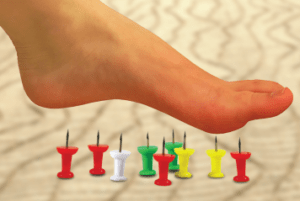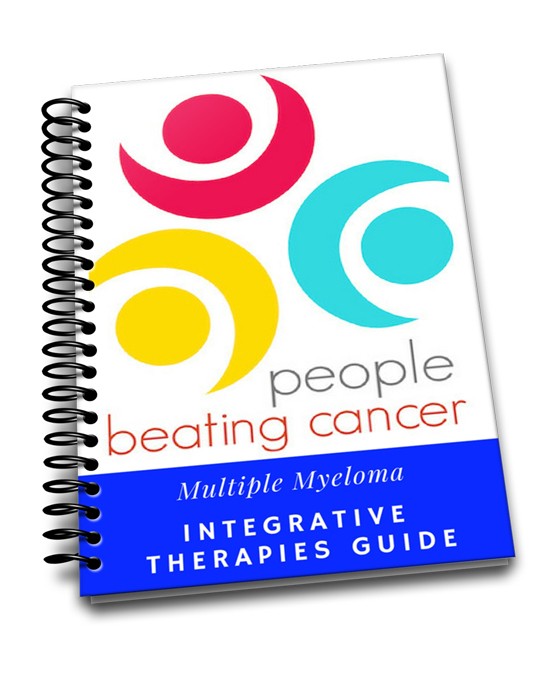“Bortezomib-induced peripheral neuropathy (BIPN) is a common and debilitating MM side effect. Our pilot study demonstrated that acupuncture is safe and can decrease total neuropathic symptoms.”
If you have been diagnosed with multiple myeloma at some point in your therapy plan you will probably undergo a chemotherapy called bortezomib aka Velcade. If you undergo bortezomib a little over a third (35%) of the people reading this post will get a painful side effect called Bortezomib-induced peripheral neuropathy (BIPN).

According to the study below about half of the patients who develop BIPN (17%) will lower their dose of Velcade in hopes of slowing or stopping BIPN and of those, .4% will choose to stop Velcade therapy completely because the pain is so severe.
The problem with lowering one’s dose of chemotherapy is that the change might reduce the MM fighting power of your chemo regimen. I mean, that’s why you are undergoing chemotherapy in the first place.
That’s the bad news. The good news is that, according to the study linked below, “acupuncture is safe and can decrease total neuropathic symptoms…” I hasten to add that I don’t think relief will happen only after a persistant effort.
Further, the third study linked below offers BIPN therapies such as vitamin supplementation and exercise that may help as well.
For those MMers who reduce their dose of Velcade, please consider evidence-based therapies shown to integrate with and enhance the efficacy of Velcade including curcumin, omega-3 fatty acids, CBD oil, and others.
Have you been diagnosed with MM? Are you experiencing BIPN?
Thank you,
David Emerson
- MM Survivor
- MM Cancer Coach
- Director PeopleBeatingCancer
Recommended Reading:
Prevention of chemotherapy-induced peripheral neuropathy
Acupuncture-Reduce ASCT Side-Effects-Multiple Myeloma
“Background: Bortezomib-induced peripheral neuropathy (BIPN) is a common and debilitating side effect. Our pilot study demonstrated that acupuncture is safe and can decrease total neuropathic symptoms. However, there is lack of knowledge in which individual BIPN symptoms benefited from acupuncture.
Purpose: To characterize individual symptoms reduced by acupuncture in patients with BIPN.
Methods: Patients with multiple myeloma treated with bortezomib who developed BIPN grade 2 or above, based on National Cancer Institute Common Terminology Criteria for Adverse Events (NCI CTCAE), were enrolled and received 10 acupuncture treatments over 10 weeks. Self-reported BIPN-associated symptoms assessments were collected weekly at baseline, during, and after acupuncture treatment using the Neuropathy Pain Scale (NPS) and the Functional Assessment of Cancer Therapy/Gynecologic Oncology Group–Neurotoxicity (FACT/GOG-Ntx) questionnaires. Changes in individual symptoms were analyzed based on FACT/GOG-Ntx and NPS scores.
Results: There were statistically significant reductions in individual symptoms in both NPS and FACT/GOG-Ntx. The FACT/GOG-Ntx reductions were most pronounced in hand/feet numbness/tingling, discomfort, and trouble walking. The sensory symptoms, such as tingling and numbness, especially in the feet, reduced the most (P < .0001), and motor dysfunction also reduced significantly (P = .0001). Both hearing and dysfunction scores were also statistically significantly increased, indicating improved symptoms. The NPS scores showed significant symptom relief in all 10 items from the NPS assessment, particularly in cold sensitivity and an unpleasant feeling.
Conclusions: Acupuncture can improve multiple symptoms associated with BIPN, particularly numbness and tingling in hands and feet, cold sensitivity, and an unpleasant feeling. Further randomized control trials are warranted to confirm our findings.”
“…Peripheral neuropathy (PN) is a significant dose-limiting toxicity of bortezomib that typically occurs within the first courses of bortezomib, reaches a plateau at cycle 5, and thereafter does not appear to increase.5…
The results of the SUMMIT32 and CREST33 phase 2 trials accurately provide data about the incidence, severity, and risk factors of BIPN. SUMMIT, a multicenter, open-label nonrandomized trial, enrolled 202 patients with relapsed and refractory MM treated with 1.0 or 1.3 mg/m2 of IV bortezomib twice weekly for 2 weeks, in cycles repeated every 3 weeks for a maximum of 8 cycles.32 The CREST trial33 applied a similar study design and treatment schedule in 54 patients. Pooled safety data from these trials showed that BIPN was one of the most common and important drug-related adverse events. Peripheral neuropathy was diagnosed in 90 of 256 (35%) enrolled patients. Grade 1 or 2 neuropathy occurred in 22% of patients, whereas grades 3 and 4 BIPN occurred in 13% and 0.4%, respectively. Dose reduction due to neurotoxicity was required in 12% of patients, and 5% of patients discontinued treatment.”
MANAGING THE SYMPTOMS
The following suggestions may help you with symptoms of peripheral neuropathy. Always check with your healthcare provider before taking new medications.
-
Massage the affected area with cocoa butter.
-
Take B-complex vitamins.
-
Take folic acid supplements.
-
Take amino acid supplements.
If symptoms become more severe, your healthcare provider may recommend the following.
-
Pain medication or other medication for nerve pain relief
-
Stopping treatment for a period of time
-
Lowering the dose of treatment
-
Physical therapy




